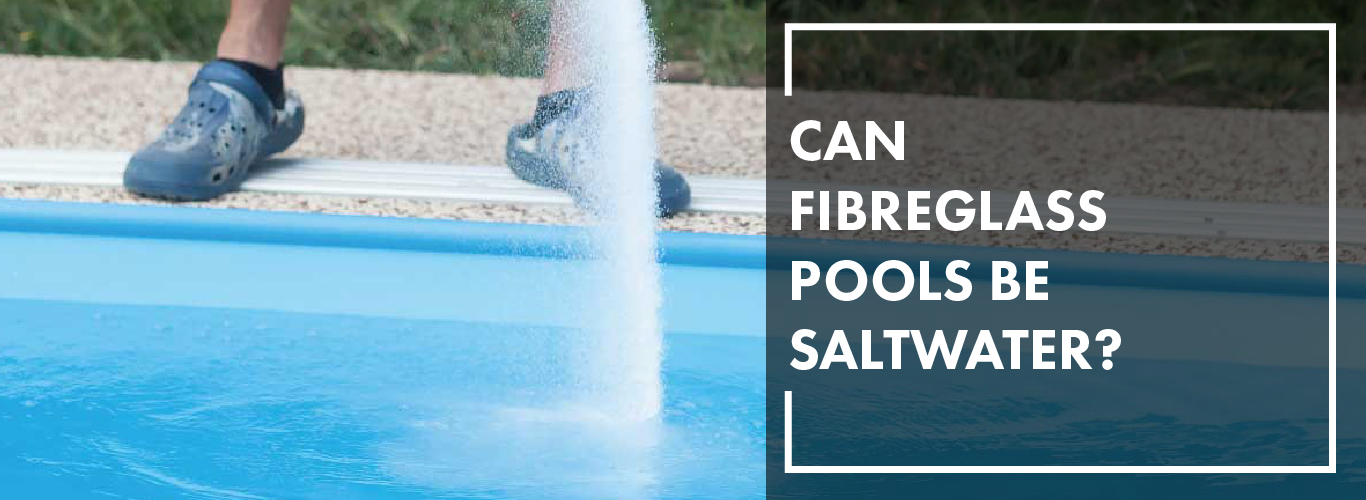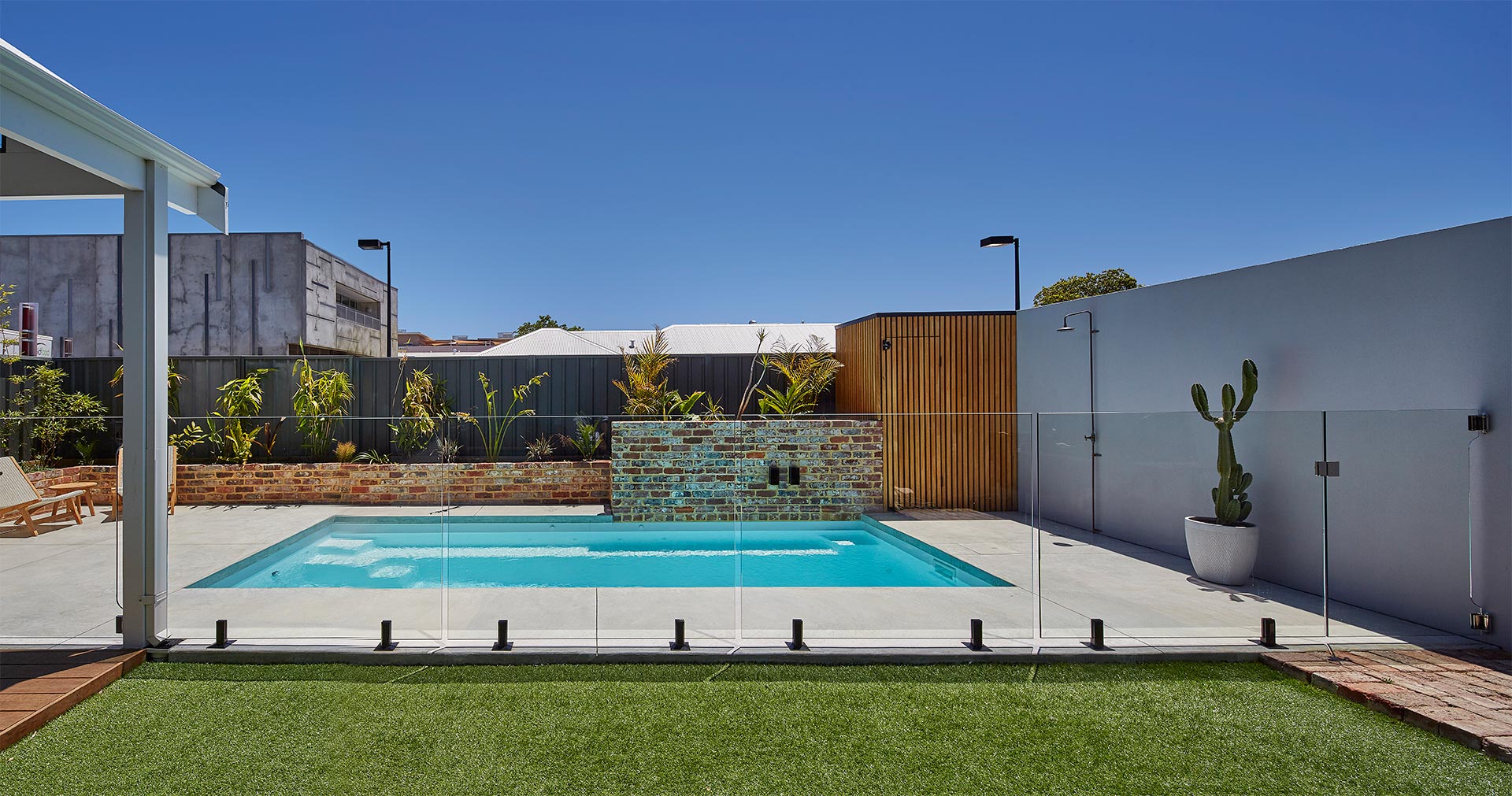Can Fibreglass Pools Be Salt Water?
Pools may make use of a salt water system or a chlorine system. Each has its own benefits and drawbacks, and it’s important for you to understand these so that you can keep your pool in top condition. While many people are familiar with chlorine pools, not too many people know much about salt water pools. In this article, we’ll help you understand what a salt water pool is and whether or not it is a good option for your fibreglass pool. Read ahead to find out more.

What is a salt water pool?
A salt water pool is one that makes use of a salt chlorine generator. Here, salt is added to the water in the pool and the generator of your pool will directly convert it into chlorine. The salt added must be at a level high enough to allow the functioning of the machine. A salt chlorinator’s range is usually between 3,000 and 4,000 parts per million, and such swimming pools have salinity levels that are 1/10th the salinity level of the ocean. So you don’t have to worry about tasting a lot of salt even if the water from your swimming pool enters your mouth. It’s not going to be as salty as the sea. In fact, you’ll probably taste about as much salt as you would in a teardrop.
Is it possible for fibreglass pools to be salt water pools?
When it comes to compatibility, fibreglass pools have a high level of compatibility with salt water systems. Instead of using chlorine doses through tablets, liquids, or powders to maintain a clean pool, salt is used, and the salt chlorine generator works to convert the salt used into chlorine. This can keep your fibreglass pool clean without the many side effects that come with using chlorine swimming pools.
Nature of fibreglass pools
Fibreglass pools are virtually non-porous and smooth. They require less expenditure for maintenance and cleaning and don’t attract bacteria and algae in the same way that other pools do. Vinyl liner pools with metal parts, as well as connections, will corrode with salt water being used.
Salt water also destroys interior surfaces of gunite or concrete pools, particularly if they have plaster in them. The benefit of using a salt water system in a fibreglass pool is that its smooth surface will hardly ever collect bacteria and algae. This means that you’ll be saving on maintenance charges and cleaning, without having to worry about any risk of corrosion of the pool surface.
Salt water pools – the preferred choice for fibreglass
A lot of families actually report that they prefer salt water systems for their fibreglass pools because these feel cleaner and don’t seem to have the same chlorine taste that other chlorine pools do. They also don’t have to experience the smell or the eye-burning that is so common when a chlorine pool is used. Salt water can help keep your fibreglass pool a lot cleaner, and you may even get a silky feel when you’re in the pool. It is reported that almost 80% of people in Australia make use of a salt water system in their swimming pool, and more and more homes are shifting to make use of salt water systems today.
You need to be careful
You need to keep an eye on the area around your fibreglass pool. You may have concrete, equipment, or a deck around your pool, which may be subjected to splashing every time a person enters and exits the pool. While these surfaces will dry in time, the concentration of salt is high and will corrode objects that have aluminum or metal fittings. It’s important that you use fresh water and wash down such surfaces to prevent this from occurring. You also need to ensure that any handrails or guards that you want to install are compatible with the salt water system you’re using.

Cost
A salt chlorine generator ranges between $600 and $2,000, with maintenance being between $50 and $100 on an annual basis. The shelf life of salt chlorine cells is usually 3 to 7 years. Fibreglass pools require 40 to 50 pounds of salt to be added for every 2,000 gallons of water.
What are the benefits of using a salt water fibreglass pool? There are many benefits that have made salt water fibreglass pools a popular choice among people. These are:
They’re safer
The chlorine levels released by salt chlorine generators are much lower than the concentration in chlorine pools. Such chlorine is also not as harsh on the skin as typical chlorine pools are. This makes them safer to use without worrying about any hazards that can result from exposure to such harsh chemicals. You can even keep your eyes open without having to worry about damage caused to your eyes or any pain that is so common when a chlorine pool is used.
Regular disinfection occurs
Salt water systems have regular disinfecting mechanisms that help get rid of contaminants from your pool. The process of electrolysis releases hypochlorous acid when salt dissolves in water and helps maintain a clean pool, making it safer for you and your family to swim. An unclean pool can be a major health hazard, and with regular disinfection taking place thanks to the salt chlorine generators, you won’t have to worry about safety when anyone goes out for a swim in the pool.
They can cleanse the skin
Salt water has the ability to exfoliate, rejuvenate, and even detoxify the skin. It increases the ability of the skin to lock in moisture, helping to nourish your skin and giving it a smooth feel.
You won’t be left smelling like chlorine
A major drawback of using chlorine pools is that you’re going to come out smelling like chlorine, and this unpleasant smell is strong and lasts for long. With salt water fibreglass pools, you don’t have to worry about coming out of the pool smelling like chlorine. These pools have very low concentrations of chlorine and aren’t harsh on the body.
Even people with allergies can use it without worrying
If you’re generally prone to itchy or dry skin, you may find a lot of relief through the use of fibreglass pools. People who are allergic to chlorine will be able to enjoy going for a swim in the pool without worrying about getting any allergic reactions. In this way, you get the benefit of having a clean pool, which is very important, but you get to avoid the side effects of chlorine use. Salt water systems can add to the many benefits fibreglass pools already offer and make it easier for you and your family to head out for a swim in your backyard.
It’s imperative that you check with a professional when making a decision about buying a salt water system for your fibreglass pool. You need to know everything about how to run it and how to maintain it so that you can ensure it functions efficiently, and you don’t have to spend excessively on its repair.
Ensuring your salt water fibreglass pool is well maintained and performing regular checks is crucial if you want to prolong the life of your pool and make the most of it.

